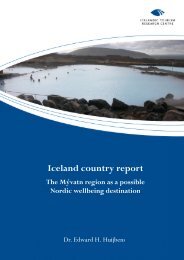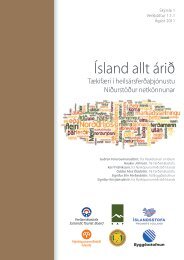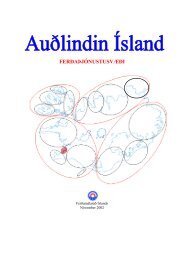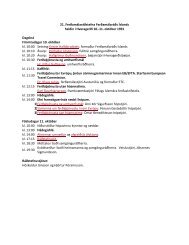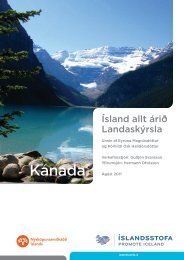Untitled
Untitled
Untitled
You also want an ePaper? Increase the reach of your titles
YUMPU automatically turns print PDFs into web optimized ePapers that Google loves.
In Urry’s account it is clear that a large and highly significant part of<br />
globalisation also consists of very concrete assemblages of “objects” like<br />
information and communication technologies, aeroplanes, fossil fuel, food,<br />
natural resources, and in general the geographical mobilities of corporeal<br />
humans and material commodities. Like tourism, then, globalisation thus<br />
readily transcends divisions between “society and nature” and questions<br />
the concepts of society and nature as traditional cornerstones of social<br />
theorising. However important and unavoidable these concepts may be,<br />
globalisation in the material understanding favoured here, suggests that we<br />
before and after society and nature all inhabit the one and the same old<br />
globe, that is, the Earth.<br />
Globalization indicates an intention to consider earth in its real form,<br />
that is to say as a globe /…/ But if the earth is a globe, where<br />
anthropologists nowadays wonder, is twilight? Provided we can find a<br />
place for the twilight, this cannot be the same for all (Farinelli 2009, no<br />
pagination).<br />
No matter how similar and all-embracing the forces of globalisation<br />
may be, on the Earth, globalisation “cannot be the same for all”. Different<br />
peoples and places will inevitably be affected in particular ways dependent<br />
upon the respective specific qualities and relative locations of themselves<br />
and their places.<br />
In as much as globalisation refers to actual processes and relations<br />
on the ground, for example an increase in international financial<br />
integration, divisions of labour and production, it can also be conceived of<br />
as an ideology articulated by various actors and reflective of their<br />
respective interests. There are those that (re)present globalisation as both<br />
inevitable and natural, for example by claiming that “labour markets<br />
should be made more flexible and capital should be able to invest or<br />
disinvest in industries or countries at will” (Urry 2003, p. 5). Then there<br />
are those that distinguish globalisation as an ideology of unifying forces<br />
that threaten the independence and identity of local cultures and places as<br />
well as countries. Strategies to counter what is considered to be<br />
homogenising forces of globalisation include not only adaptive responses,<br />
like the marketing of tourist places as distinct and unique, but also political<br />
and religious regionalisms and nationalisms that sometimes even evoke<br />
and signify tourism as negative or a threatening “other”.<br />
69





